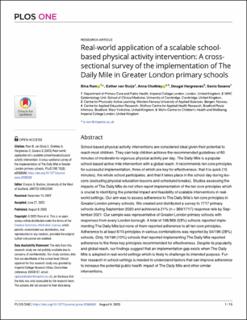| dc.contributor.author | Ram, Bina | |
| dc.contributor.author | Van Sluijs, Esther M. F. | |
| dc.contributor.author | Chalkley, Anna | |
| dc.contributor.author | Hargreaves, Dougal S. | |
| dc.contributor.author | Saxena, Sonia | |
| dc.date.accessioned | 2023-08-30T11:30:49Z | |
| dc.date.available | 2023-08-30T11:30:49Z | |
| dc.date.created | 2023-08-28T14:23:42Z | |
| dc.date.issued | 2023 | |
| dc.identifier.issn | 1932-6203 | |
| dc.identifier.uri | https://hdl.handle.net/11250/3086374 | |
| dc.description.abstract | School-based physical activity interventions are considered ideal given their potential to reach most children. They can help children achieve the recommended guidelines of 60 minutes of moderate-to-vigorous physical activity per day. The Daily Mile is a popular school-based active mile intervention with a global reach. It recommends ten core principles for successful implementation, three of which are key for effectiveness: that it is quick (15 minutes), the whole school participates, and that it takes place in the school day during lessons (excluding physical education lessons and scheduled breaks). Studies assessing the impacts of The Daily Mile do not often report implementation of the ten core principles which is crucial to identifying the potential impact and feasibility of scalable interventions in real-world settings. Our aim was to assess adherence to The Daily Mile’s ten core principles in Greater London primary schools. We created and distributed a survey to 1717 primary schools during September 2020 and achieved a 21% (n = 369/1717) response rate by September 2021. Our sample was representative of Greater London primary schools with responses from every London borough. A total of 196/369 (53%) schools reported implementing The Daily Mile but none of them reported adherence to all ten core principles. Adherence to at least 6/10 principles in various combinations was reported by 54/196 (28%) schools. Only 19/196 (10%) schools that reported implementing The Daily Mile reported adherence to the three key principles recommended for effectiveness. Despite its popularity and global reach, our findings suggest that an implementation gap exists when The Daily Mile is adopted in real-world settings which is likely to challenge its intended purpose. Further research in school settings is needed to understand factors that can improve adherence to increase the potential public health impact of The Daily Mile and other similar interventions. | en_US |
| dc.language.iso | eng | en_US |
| dc.publisher | PLoS | en_US |
| dc.rights | Navngivelse 4.0 Internasjonal | * |
| dc.rights.uri | http://creativecommons.org/licenses/by/4.0/deed.no | * |
| dc.title | Real-world application of a scalable school-based physical activity intervention: A cross-sectional survey of the implementation of The Daily Mile in Greater London primary schools | en_US |
| dc.type | Peer reviewed | en_US |
| dc.type | Journal article | en_US |
| dc.description.version | publishedVersion | en_US |
| dc.rights.holder | © 2023 The Authors | en_US |
| dc.source.journal | PLOS ONE | en_US |
| dc.identifier.doi | 10.1371/journal.pone.0288500 | |
| dc.identifier.cristin | 2170269 | |
| cristin.ispublished | true | |
| cristin.fulltext | original | |
| cristin.qualitycode | 1 | |

